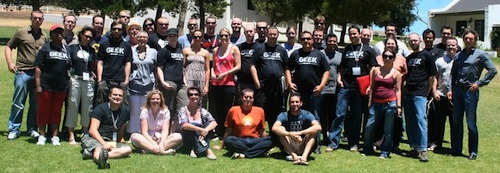[By Ivo Vegter] The second GeekRetreat was held last weekend in the picturesque surroundings of Stanford, in the Western Cape. This gathering of technology entrepreneurs, educators, journalists, and venture capitalists is unique in its format and composition.
Attendance is limited, so that everyone gets to talk to everyone else, and no cliques form. There is no planned schedule. It is planned on the day by the attendees themselves. Each brings their own passions, problems, solutions or proposals.
The result is that ideas that otherwise would not occur to organisers, are not designed to attract sponsors, or emerge only after a conference has started, get aired.
Many topics were discussed, ranging from serious (such as my own discussion on banking law, described in more detail in a column on The Daily Maverick), to ambitious (how to crowd-source start-up funding), to socially relevant (using technology to improve primary and secondary education), to reflexive (tips on coding and general work productivity) to recursive (a talk on giving better talks).
Some of these will result in concrete projects, though much of the value of the event was merely in sharing ideas, gaining new perspectives, and meeting the people who care about them.
Telecoms lobbying
Among the technology topics, one key session was led by Samantha Perry, the editor of Brainstorm, a technology magazine. In light of recent changes in the telecommunications environment, such as the court ruling that permits self-provision, the progress on interconnection regulation, and the completion of the Seacom undersea cable, it asked whether there was still much point in lobbying for legal or regulatory change.
The discussion was lively, but concluded that many barriers remain if the country is to lower the cost of communication and extend Internet access to as broad a population as possible.
There was consensus that any commentary, advocacy or active lobbying would have to address specific barriers, and do so in a consistent, clear manner. In particular, it should not try to propose technical solutions to problems. Many entrepreneurs working independently and testing their ideas in the open market are better at discovering those, provided there are no legal barriers to doing so.

Of the specific barriers discussed, local-loop unbundling was viewed with surprisingly little enthusiasm. International experience had shown the process to be slow and fraught with complexity. By the time it has an effect, the benefits were thought to be too little too late, especially on a continent where mobile has already outstripped fixed access by an order of magnitude.
The group also noted that many specific interventions are merely small parts of a larger puzzle. Neither number portability, nor lower interconnect rates, for example, can be expected to spur competition and cost reductions in isolation.
It did, however, seem useful to those present to prioritise regulatory issues that could most beneficially be raised with the media, the department of communications, the Independent Communications Authority of South Africa, or with broader government entities such as the department of trade & industry or the National Planning Commission.
Spectrum allocation was discussed as a likely contender for the top spot on any priority list, because much radio frequency spectrum is presently unused, and more will be freed by the introduction of digital terrestrial television. How this is allocated, or whether it is made tradeable, will have a significant impact on the innovative and efficient use to which it can be put.
Geek School
Education was a theme that ran through many of the sessions, often spontaneously. The sense that education is the key to unlock the future prosperity and growth of our nation, but that the status quo is untenable, was strong.
Education was discussed from many angles. Primary and secondary school level featured prominently, especially in light of the deplorable recent performance of public education. The fear was voiced that a new “lost generation” would be created unless private individuals take initiative and do something about it.
How to use technology to improve education was also a common topic. One innovative proposal involved promoting games not usually considered educational for their pedagogic value. It was noted that many overtly education games bore children to distraction. The analogy was made between old-fashioned board, card or dice games, which are entertaining and do not have a direct educational purpose, but which do teach language, strategy, motor skills, arithmetic or finance.
In another discussion, the fact that fixed Internet access, at 11% of the population, remains limited to wealthy elites, was highlighted. The majority of SA’s population (75%) relies on mobile phones as their sole means of communication. Moreover, few of those are smart phones, and even the ability to run Java is not universal on the basic units which many of the poor use. As a result, education solutions not only have to be mobile, but have to work with technologies such as USSD, available on even the lowliest of GSM handsets.
At the school-leaver level, a promising proposal — establishing a Geek School — was made by Heidi Schneigansz, a producer at Quirk eMarketing, but known by her online handle, SnowGoose. This venture would start by introducing grade 10 and 11 learners to Web entrepreneurship as a potential career alternative after leaving school.
Those who start online technology businesses, instead of attending university, would then find in the Geek School an inexpensive training and support facility. Over a period of several months or more, it would give emerging entrepreneurs access to successful start-ups and business leaders. Using social networks and other technology, students will be able to develop skills, learn about pitfalls, and solicit advice.
Several attendees proved very enthusiastic in helping with such a project, offering either technology expertise, market knowledge, or start-up experience to put flesh on the bones of what prior to this GeekRetreat was merely a skeleton of an idea.
The 50 invited geeks, chosen for their record of contributing to the development of the internet in SA, their proven value to the inaugural GeekRetreat in July 2009, or their commitment to making new projects happen, proved to be a dynamic, vibrant group, brimming with ideas and the enthusiasm to make them happen.
Each person present in Stanford last weekend was raised on the power of social networks and high technology, and nurtured by the experience of collaboration. Each appeared optimistic not only about SA’s potential, but also about their own ability to help achieve it.
- Ivo Vegter is a freelance journalist
- Vegter photo credit: Sally Shorkend/The Daily Maverick
- Subscribe to our free daily newsletter
- Follow us on Twitter or on Facebook





